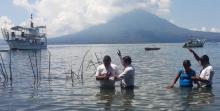News
Story by Frenita Buddy Fullwood
The Board of Adventist Risk Management, Inc. has named Tim Northrop as the new President, CEO for the company and its affiliated Gencon Insurance companies. Northrop has extensive knowledge in insurance after serving in multiple positions within ARM, most recently as Senior Vice President. He replaces Bob Kyte who retires May 31 to pursue other business opportunities in Idaho.
Story by Jessica Beans
Despite the cold weather, more than 500 gathered at Kettering College’s eighth annual Spring Into Health 5K run/walk and Wellness and Fun Fair on Sunday, April 10.
“I was impressed with the turnout in spite of the cold weather this year,” says Victor Brown, dean for Enrollment Management and Student Affairs. “Over the years this event has grown, but we hope that the number of participants will continue to grow so that we will be able to donate even more in the future!”
Paula Olivier, pastor of First church of Montclair in Montclair, N.J., says that for years the Lord impressed her to explain the Sabbath in a different way. “As Seventh-day Adventists, I think we excel at explaining the ‘what‘ of our beliefs, but sometimes pay little attention to the ’why.’ I believe that once [we] define the “why,” we can teach others to embrace the Sabbath as an extension of God’s love for us,” she adds.

Story by Hope Channel staff
Derek Morris has been named President of Hope Channel Inc., the global Christian television network of the Seventh-day Adventist Church. Morris, who currently serves as editor of Ministry magazine, will now oversee the operations of the Hope Channel network of 43 affiliate channels.
“The process of nomination and appointment of Hope Channel’s new president was done under the guidance of the Holy Spirit with seasons of prayer,” said Billy Biaggi, Chairperson of the Hope Channel Board of Directors.
Dear Co-workers,
I want to personally thank you for everything you do for the advancement of God's kingdom in your communities and in your churches. I am grateful for this because mission must be at the very top, front, and center of our agenda.
I believe that in order to be effective in reaching others we must have a united vision which leads us all in the same direction. We also need an ongoing and active conversation, which empowers our pastors, congregations, and institutions to reach people within their sphere of influence. This is why, during our 2015 Year-end Meeting, our North American Division Executive Committee voted three very significant outreach initiatives.
Story by Andrew McChesney / Adventist Review
The Seventh-day Adventist Church’s official membership has topped 19 million for the first time in history, and the number of local churches has doubled worldwide to more than 80,000 in just two decades, according to newly released figures.
Story by Kimberly Luste Maran
All members of the Seventh-day Adventist Church are part of a constituency, which is defined as a group of voters in a specified region who elect representatives to a legislatorial body. In this case, church members of the Columbia Union Conference have designated about 310 delegates who will represent them during the quinquennial constituency session occurring this May (2016).
Every five years representatives elect union leadership, receive reports from union leaders and entities, and vote on general decisions and church business. Reports on finances, church membership, auditing and other statistics are also received and voted. The session delegates will also vote on any proposed changes to the union constitution and bylaws.










